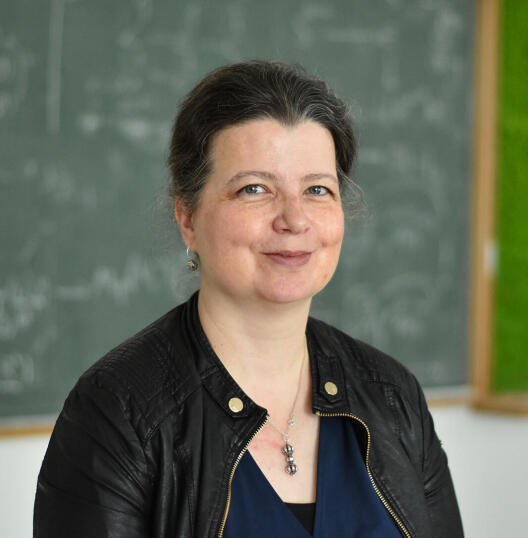Interview with Prof. Ursula Ludwig

Ursula Ludwig has been Professor of Theoretical Mathematics at the Mathematical Institute at Münster University and investigator at the Cluster of Excellence Mathematics Münster since April 2022. In this interview she talks about her research, her career so far, and what the best thing is about being a mathematician.
Ms. Ludwig, how have your first few months in Münster been?
Even before I started here, I got a lot of support from colleagues, as well as from the institute’s secretariats. Besides the wide-ranging, high-quality research and teaching programme, there’s a very upbeat atmosphere here – and one which is marked by mutual esteem. Working with the students at Münster also gives me a lot of pleasure!
What is the focus of your research and what are you working on at the moment?
Since the beginning of my career in mathematics, I have been interested in singular spaces. Over the years, I’ve studied these mathematical objects using a variety of methods. Currently, I’m studying questions of global analysis on singular spaces. The Leidmotiv in global analysis is the comparison between topological invariants, i.e. information which can be derived solely from the shape of objects, and analytic invariants, i.e. information which can be obtained analytically, for example through solving differential equations.
Where did you study and work before you came to Münster?
After studying mathematics and physics in Cologne and Paris, I did my PhD at the University of Leipzig and at the Max Planck Institute for Mathematics in the Sciences there. After my PhD, I did short postdocs in Paris, Marseille, Oxford and Edinburgh, was a research associate in Freiburg and held interim professorships at the Universities of Berlin and Bonn. I also spent two years in Paris as a Marie Curie IEF Fellow. The past few years, I worked at the University of Duisburg-Essen.

Why did you decide to come to the University of Münster?
Münster is one of the leading centres of mathematics in Germany. What I find impressive is how, besides the excellence in different fields of mathematics, networking within different areas has developed ever more strongly. I’ll definitely be able to benefit greatly from this in my research – and I hope that, for my part, I can contribute to it, too.
When you look back over your career, what have been the most important moments so far?
Every stage and every place in my career were formative in different ways for me, both as a mathematician and in a personal sense, and they opened up new opportunities for development. Longer research stays in Berlin, Paris and, lastly, at the Max Planck Institute for Mathematics in Bonn always stimulated new ideas and paradigm shifts in my research. At Freiburg and Duisburg-Essen I assumed responsibilities in teaching and academic administration and, together with other colleagues, started third-party funding projects. What I’m looking forward to in Münster is setting up my own working group.
What for you is the best thing about being a mathematician?
The clarity you achieve when the different parts of the puzzle and bits of idea you have come together to present a solution. The creativity. What I find very rewarding is the exchange of views with others and the internationality.

